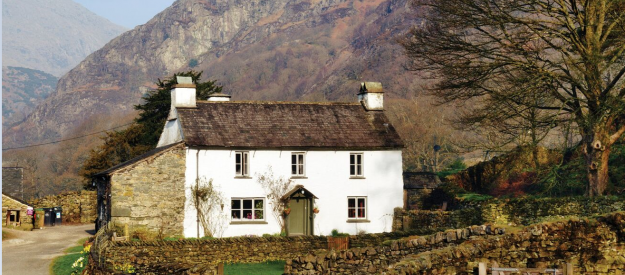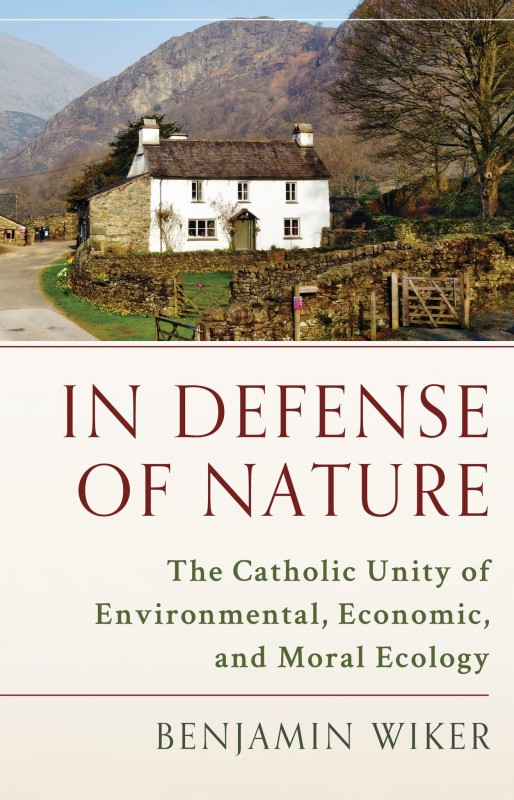"We are losing our attitude of wonder, of contemplation, of listening to creation and thus we no longer manage to interpret within it what Benedict XVI calls 'the rhythm of the love-story between God and man.'"
+ Pope Francis
“In Defense of Nature” provides context, seeks unity

Readers of Catholic Ecology know that this blog had two goals: To examine the Catholic engagement of ecological protection and to transcend ideological polarization. If I’m doing my job, my posts will alternate between delighting and unsettling everyone. That’s why I was thrilled with Dr. Benjamin Wiker’s book In Defense of Nature: The Catholic Unity of Environmental, Economic, and Moral Ecology.
It’s a book that every Catholic eco-advocate and catechist should read and ponder.
I have three reasons for that claim:
1. Wiker makes the important connection between the laws of nature and natural law.
It’s an understatement to say I was elated when I read In Defense of Nature. Given my blog’s tagline “Where the laws of nature meet natural law,” I felt that I found in Wiker a long-lost brother.
I say this because Wiker gets right to the point by asking the same questions I do:
If we can befoul nature by violating its intrinsic order and beauty, can we do the same to human nature and in particular human sexuality? If intemperance and greed destroy the natural environment, do they also destroy the moral environment and sexuality itself?
The answer, of course, is yes. Unequivocally. That’s the exact point made by Saint John Paul II, Benedict XVI, and Pope Francis himself in Laudato Si’.
Showcasing the linkage between the laws of nature and natural law is, without doubt, the most vital Catholic contribution to the ecological area, and Wiker is to be applauded for underscoring it as finely as he does. As Benedict XVI noted in his encyclical Caritas in Veritate, “Our duties towards the environment are linked to our duties towards the human person.” And this link gets us to the next reason why you should read Wiker’s book.
2. Building unity by finding common ground and common errors.
Because the laws of the natural environment are linked and mirror the laws of human nature, Wiker finds reasons to applaud and critique both sides of the ideological aisle. More to the point, he demonstrates how both ideological extremes have something to contribute and how, ultimately, they make precisely the same mistakes.
The Left understands the exquisite, delicate harmony of the natural order. The Right understands the exquisite, delicate harmony of the moral order. Each side will tell you how very little a deviation it takes to cause disaster to the natural or moral order. But each refuses to see the other’s argument.
All that is needed to heal our present divisions is simply this: that each sees what the other sees so clearly, and how it all fits together.
Wiker admits that this is “no small task,” but it’s one he deftly undertakes. Good that he does, too, because this observation—this desire to heal—is vital to offering ways forward in our current, troubled discourse.
Wiker takes on a wide array of issues, which—as Pope Francis underscores in Laudato Si’—are all connected. From the food and agricultural industries, pornography and prostitution, and gluttonous over-consumption, waste production, and disposal, Wiker’s examination connects issues that may be dividing points between the Left and Right but that are, in fact, points of common ground.
But making this observation isn’t all Wiker wishes to do. More notably, he wants us to see the common root of why both the Left of the Right often get so much so wrong.
And that gets us to the third reason why this book is a must-read for Catholic ecologists and catechists.
3. The mastery of nature
Few people ever ask about the origins of their cultural and intellectual worldviews. But like fashion, food, and faith, what we consider normative are realities that have been handed down to us. But some of what passes through the centuries is beneficial for humanity and some is not.
In the case of damaging ethics championed by one ideology or the other—whether same-sex marriage or the destruction of ecosystems—there is a shared root cause: a way of seeing nature as both malleable and made merely for the use of humanity. This view, Wiker reminds us, rose up in the early seventeenth century, most especially with the thought of Francis Bacon.
Wiker shows again and again how Baconian thought—with its desire that “man [may] endeavor to establish and extend the power and dominion of the human race itself over the universe,” in an “empire of man over all things”—is responsible for so much that is wrong today.
Wiker’s thesis—one that I support and write of myself (as I did a few years back)—sheds light on so much that is so wrong in our age—from environmental destruction to the destruction of the family.
In other words, the mastery of nature that one ideology cheers and the other bemoans—say, the Left’s love of technology to allow greater sexual opportunities without the cost of conceiving new life (or killing that life if it is inconveniently conceived), or the Right’s love of technology to extract and consume planetary resources, no matter the cost—are all denials of core Christian principles. The reassertion of Christian belief is, then, the real contribution that Catholics should be striving for in the ecological arena.
Wiker’s In Defense of Nature goes a long way in helping us understand all this—and how to see the common roots of the ideological civil war underway.
Wiker’s style may not appeal to everyone. And his analysis of climate change may attempt to walk too fine a line in what seems an attempt to woo climate deniers.
But overall, In Defense of Nature is a must-read. And it will make the perfect gift for the hardcore ideologue in your life who would benefit from learning what they have in common with the folks they’re fond of arguing with.
 In Defense of Nature: The Catholic Unity of Environmental, Economic, and Moral Ecology (Emmaus Road Publishing) is available online and at all fine Catholic bookstores.
In Defense of Nature: The Catholic Unity of Environmental, Economic, and Moral Ecology (Emmaus Road Publishing) is available online and at all fine Catholic bookstores.
Benjamin Wiker received his Ph.D. from Vanderbilt University in Theological Ethics and is currently Professor of Political Science and Director of Human Life Studies at Franciscan University of Steubenville. His previous books include Worshipping the State, Politicizing the Bible (with Scott Hahn), The Catholic Church and Science, 10 Books Every Conservative Must Read, The Darwin Myth, 10 Books that Screwed Up the World, Answering the New Atheism (with Scott Hahn), A Meaningful World, Architects of the Culture of Death (with Don DeMarco), The Mystery of the Periodic Table, and Moral Darwinism. He is the husband of one wife, the father of seven children, and the grandfather of two children. He lives in Ohio.
Image from the front jacket courtesy of Emmaus Road Publishing.


















